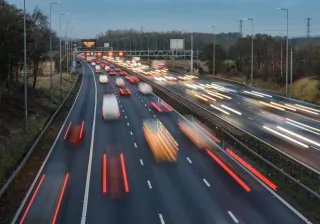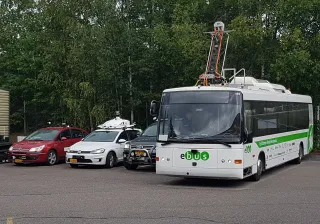The transport sector should undergo a significant transformation so that Finland can achieve its targets for fossil-free transport. Electrification of transport is one of the answers, but the solutions must also be applied more extensively in practice. VTT continues to strengthen its scientific competence in electric transport research both in Finland and internationally. VTT's Senior Researcher, Doctor of Science in Technology Mikko Pihlatie, was appointed Research Professor of electrification of transport as of 1 May 2023.
Transport makes up roughly one quarter of Finland's carbon dioxide emissions. Although the technologies enabling the electrification of transport have developed rapidly over the past ten years, there is still work to be done in applying the solutions. Pihlatie reminds us that the green transition is an enormous opportunity for Finland also in the transport sector.
“In the future, Finland's competitive edge may well be access to cheap renewable electricity, and its flexible direct use in transport, industry and the built environment. In the transport sector, flexibility in sectoral integration through electrification and smart charging can bring us a large-scale competitive advantage. As to industrial investments, Finland should aim for an extensive wave of investments in three areas: renewable energy production as well as investments in the battery hydrogen value chains.”
Ari Aalto, Vice President of VTT's Mobility and Transport research area, points out that energy solutions that are independent of imports and that increase security of supply should also be used more in transport.
“The electrification of cars, vans and buses in urban transport is already progressing at a good pace, but in machinery, heavy goods vehicles (HGV), maritime transport and aviation, it is only starting. In the future, electric vehicles can also be used to balance demand spikes in the national energy system and to develop more self-sufficient and crisis-resilient solutions. Vehicle batteries can be equipped with two-way charging to provide flexibility for the entire energy system,” Aalto explains.
Research supports industrial innovations
Pihlatie has worked at VTT for a long time as a researcher and team leader in energy technologies and their application. Prior to this, he was a researcher at the Technical University of Denmark (DTU). In 2010, Pihlatie was involved in launching national applied battery research.
VTT's research on electric transport aims to support the green transition of transport, creating new innovations and applying them. In electric transport research, Pihlatie calls for cooperation between research and industry.
“From the point of view of industrialisation of innovations, it is essential that top research is combined with suitable partners at a sufficiently early stage. This enables us to consider the needs and requirements of end users in the development phase of innovations. If we want to have significant influence, we need to be able to create ecosystems that connect different parties at least at European level,” Pihlatie says.
“Extensive expertise and systematic innovation are required so that electric solutions can become more widespread in transport. Mikko Pihlatie has been doing research on electrifying transport for a long time, and he strengthens VTT's role as an innovator in the field both nationally and internationally,” Aalto says.
Cities have the opportunity to lead the way
The future of electrification of transport is full of opportunities. Pihlatie reflects on how extensively heavy-duty vehicles in industrial transports and long-haul freight, or air traffic can be electrified.
“What role does hydrogen play? How can we ensure the performance, energy efficiency and safety of batteries and electric vehicles? As a Research Professor, I hope to be able to answer these questions as well, and to see solutions applied more boldly in practice. At VTT, we are currently developing, for example, the energy and heat management of electric vehicles, cheap two-way user-driven charging devices and fast high-power charging for heavy-duty vehicle applications,” Pihlatie says.
He points out that it is also important to support the green and digital transitions of transport in society and to outline the steering policy instruments in taxation and various incentive schemes.
“This is particularly important in areas of transport where change is only just beginning. Cities could also play a larger role as pioneers. They may consider paving the way for alternative energy and charging infrastructure in land use planning and require that at least publicly procured services use zero-emission vehicles.”









